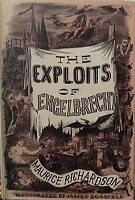 Shaun Tan, Tales from Outer Suburbia
Shaun Tan, Tales from Outer Suburbia2008 / Ebook / 96 pages / Australia
***
Memorable imagery supplemented by forgettable text, pre-literate kids making up their own stories will get the most out of it and be rewarded with benevolent nightmares.
Fave: 'Distant Rain'
Rhys Hughes, Twisthorn Bellow
2009 / Ebook / 256 pages / UK
**
The first story about the sun giving itself skin cancer was funny, but the stream-of-consciousness exploits of a xenophobic mad scientist and his cartoon character creations got less rewarding as they went on, scraping the barrel of porn puns at one point.
Fave: 'The Wings of Phœbus'
Rob Williams, Steve Scott and Bart Sears, Indiana Jones and the Tomb of the Gods
2008-09 (collected 2009) / Ecomics / 120 pages / UK/USA
***
Like the standalone novel that came out at the time, this failed to kick off a resurgence of Indy comics, maybe because the weak 2008 film didn't muster the enthusiasm expected or because the premise of tracking down three pieces of a mysterious artifact is so generic even within Indiana Jones comics. The actor likenesses are a lot better than they used to be, at least.
Iain Banks, Transition
2009 / Audiobook / 416 pages / UK
**
Iain [M.] Banks does Sliders as Quantum Leap, with more drugs, sadism and more of the same generally. Whatever happened to thin SF paperbacks?
Jonathan Lethem, Talking Heads' Fear of Music
2012 / Ebook / 141 pages / USA
***
A treatise on the art disco punks is inevitably going to provoke chapter titles like 'Is Fear of Music a Text?' It is now. Paced well for listening along, with leeway for stumbling over sentences or skimming analogies.

















































